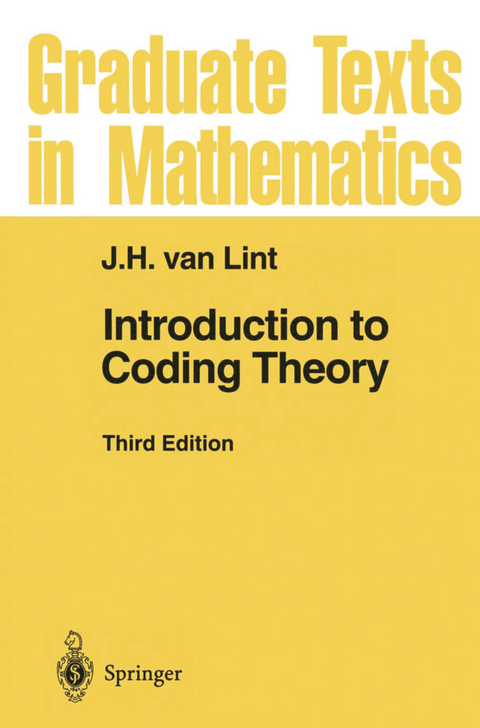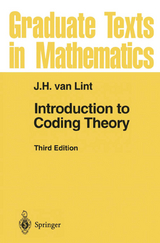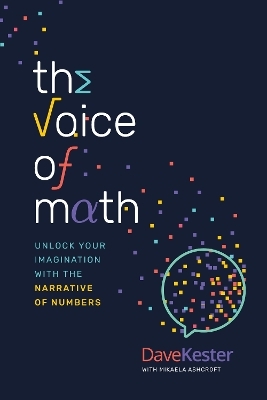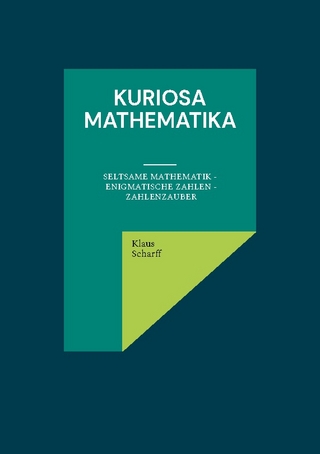Introduction to Coding Theory
Springer Berlin (Verlag)
978-3-540-64133-9 (ISBN)
Aktualisierte und erweiterte Neuauflage. Hervorragend geeignet als Lehrbuch für Vorlesungen. Zahlreiche Aufgaben mit Lösungen sowie viele Beispiele sind im Text enthalten.
It is gratifying that this textbook is still sufficiently popular to warrant a third edition. I have used the opportunity to improve and enlarge the book. When the second edition was prepared, only two pages on algebraic geometry codes were added. These have now been removed and replaced by a relatively long chapter on this subject. Although it is still only an introduction, the chapter requires more mathematical background of the reader than the remainder of this book. One of the very interesting recent developments concerns binary codes defined by using codes over the alphabet 7l.4- There is so much interest in this area that a chapter on the essentials was added. Knowledge of this chapter will allow the reader to study recent literature on 7l. -codes. 4 Furthermore, some material has been added that appeared in my Springer Lec ture Notes 201, but was not included in earlier editions of this book, e. g. Generalized Reed-Solomon Codes and Generalized Reed-Muller Codes. In Chapter 2,a section on "Coding Gain" ( the engineer's justification for using error-correcting codes) was added. For the author, preparing this third edition was a most welcome return to mathematics after seven years of administration. For valuable discussions on the new material, I thank C.P.l.M.Baggen, I. M.Duursma, H.D.L.Hollmann, H. C. A. van Tilborg, and R. M. Wilson. A special word of thanks to R. A. Pellikaan for his assistance with Chapter 10.
1 Mathematical Background.- 1.1. Algebra.- 1.2. Krawtchouk Polynomials.- 1.3. Combinatorial Theory.- 1.4. Probability Theory.- 2 Shannon's Theorem.- 2.1. Introduction.- 2.2. Shannon's Theorem.- 2.3. On Coding Gain.- 2.4. Comments.- 2.5. Problems.- 3 Linear Codes.- 3.1. Block Codes.- 3.2. Linear Codes.- 3.3. Hamming Codes.- 3.4. Majority Logic Decoding.- 3.5. Weight Enumerators.- 3.6. The Lee Metric.- 3.7. Comments.- 3.8. Problems.- 4 Some Good Codes.- 4.1. Hadamard Codes and Generalizations.- 4.2. The Binary Golay Code.- 4.3. The Ternary Golay Code.- 4.4. Constructing Codes from Other Codes.- 4.5. Reed-Muller Codes.- 4.6. Kerdock Codes.- 4.7. Comments.- 4.8. Problems.- 5 Bounds on Codes.- 5.1. Introduction: The Gilbert Bound.- 5.2. Upper Bounds.- 5.3. The Linear Programming Bound.- 5.4. Comments.- 5.5. Problems.- 6 Cyclic Codes.- 6.1. Definitions.- 6.2. Generator Matrix and Check Polynomial.- 6.3. Zeros of a Cyclic Code.- 6.4. The Idempotent of a Cyclic Code.- 6.5. Other Representations of Cyclic Codes.- 6.6. BCH Codes.- 6.7. Decoding BCH Codes.- 6.8. Reed-Solomon Codes.- 6.9. Quadratic Residue Codes.- 6.10. Binary Cyclic Codes of Length 2n(n odd).- 6.11. Generalized Reed-Muller Codes.- 6.12. Comments.- 6.13. Problems.- 7 Perfect Codes and Uniformly Packed Codes.- 7.1. Lloyd's Theorem.- 7.2. The Characteristic Polynomial of a Code.- 7.3. Uniformly Packed Codes.- 7.4. Examples of Uniformly Packed Codes.- 7.5. Nonexistence Theorems.- 7.6. Comments.- 7.7. Problems.- 8 Codes over ?4.- 8.1. Quaternary Codes.- 8.2. Binary Codes Derived from Codes over ?4.- 8.3. Galois Rings over ?4.- 8.4. Cyclic Codes over ?4.- 8.5. Problems.- 9 Goppa Codes.- 9.1. Motivation.- 9.2. Goppa Codes.- 9.3. The Minimum Distance of Goppa Codes.- 9.4. Asymptotic Behaviour of Goppa Codes.- 9.5. Decoding Goppa Codes.- 9.6. Generalized BCH Codes.- 9.7. Comments.- 9.8. Problems.- 10 Algebraic Geometry Codes.- 10.1. Introduction.- 10.2. Algebraic Curves.- 10.3. Divisors.- 10.4. Differentials on a Curve.- 10.5. The Riemann-Roch Theorem.- 10.6. Codes from Algebraic Curves.- 10.7. Some Geometric Codes.- 10.8. Improvement of the Gilbert-Varshamov Bound.- 10.9. Comments.- 10.10.Problems.- 11 Asymptotically Good Algebraic Codes.- 11.1. A Simple Nonconstructive Example.- 11.2. Justesen Codes.- 11.3. Comments.- 11.4. Problems.- 12 Arithmetic Codes.- 12.1. AN Codes.- 12.2. The Arithmetic and Modular Weight.- 12.3. Mandelbaum-Barrows Codes.- 12.4. Comments.- 12.5. Problems.- 13 Convolutional Codes.- 13.1. Introduction.- 13.2. Decoding of Convolutional Codes.- 13.3. An Analog of the Gilbert Bound for Some Convolutional Codes.- 13.4. Construction of Convolutional Codes from Cyclic Block Codes.- 13.5. Automorphisms of Convolutional Codes.- 13.6. Comments.- 13.7. Problems.- Hints and Solutions to Problems.- References.
| Erscheint lt. Verlag | 15.12.1998 |
|---|---|
| Reihe/Serie | Graduate Texts in Mathematics |
| Zusatzinfo | XIV, 234 p. |
| Verlagsort | Berlin |
| Sprache | englisch |
| Maße | 155 x 235 mm |
| Gewicht | 474 g |
| Themenwelt | Mathematik / Informatik ► Mathematik ► Arithmetik / Zahlentheorie |
| Mathematik / Informatik ► Mathematik ► Geometrie / Topologie | |
| Mathematik / Informatik ► Mathematik ► Graphentheorie | |
| Mathematik / Informatik ► Mathematik ► Wahrscheinlichkeit / Kombinatorik | |
| Naturwissenschaften ► Physik / Astronomie | |
| Schlagworte | Code • Codierung • Codierung / Kodierung • coding theory • combinatorics • error-correcting code • linear optimization • Shannon |
| ISBN-10 | 3-540-64133-5 / 3540641335 |
| ISBN-13 | 978-3-540-64133-9 / 9783540641339 |
| Zustand | Neuware |
| Haben Sie eine Frage zum Produkt? |
aus dem Bereich




